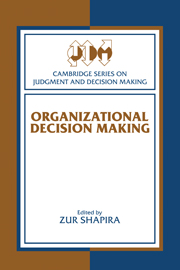Book contents
- Frontmatter
- Contents
- Series preface
- List of contributors
- Editor's preface
- Part I Introduction
- Part II Information processing and attention allocation
- Part III Preference processing
- Part IV Decision processes
- Part V Alternative approaches
- 13 Naturalistic decision making and the new organizational context
- 14 Telling decisions: The role of narrative in organizational decision making
- 15 Bounded rationality, indeterminacy, and the managerial theory of the firm
- 16 The scarecrow's search: A cognitive psychologist's perspective on organizational decision making
- Name index
- Subject index
16 - The scarecrow's search: A cognitive psychologist's perspective on organizational decision making
Published online by Cambridge University Press: 06 August 2010
- Frontmatter
- Contents
- Series preface
- List of contributors
- Editor's preface
- Part I Introduction
- Part II Information processing and attention allocation
- Part III Preference processing
- Part IV Decision processes
- Part V Alternative approaches
- 13 Naturalistic decision making and the new organizational context
- 14 Telling decisions: The role of narrative in organizational decision making
- 15 Bounded rationality, indeterminacy, and the managerial theory of the firm
- 16 The scarecrow's search: A cognitive psychologist's perspective on organizational decision making
- Name index
- Subject index
Summary
One of my favorite books is The Wizard of Oz (Baum, 1903). In this classic tale, the Tin Man seeks a heart, the Lion courage, and the Scarecrow a brain. Similarly, organizational behavior research can be viewed as a search for the heart, courage, and brains of an organization and its individuals. For example, Milgrom and Roberts's (1992) excellent book on organizations and management focuses on motivation and incentives (the heart) and risk sharing (courage). Milgrom and Roberts also examine the brains of organizations and managers – the methods they use to process information and make decisions. However, to examine the functioning of the brain, Milgrom and Roberts generally assume perfect rationality in the pursuit of goals. Yet, the “brain” of the organization, manifested in its employees, sometimes reflects less than perfect rationality. This is the focus of the cognitive perspective on organizational research.
Individual and organizational decision making
Decision making is a theme of much organizational research. For instance, Herbert A. Simon's classic work on organizations, Administrative Behavior (Simon, 1976) was written “on the assumption that decision making processes hold the key to the understanding of organizational phenomena” (p. xl). Further, Simon proposed similar ideas for both individual and organizational decision making. This approach is reasonable insofar as descriptions of organizational decision making are really descriptions of individual decision making within an organizational context (see Cummings, 1982).
- Type
- Chapter
- Information
- Organizational Decision Making , pp. 353 - 374Publisher: Cambridge University PressPrint publication year: 1996
- 6
- Cited by



